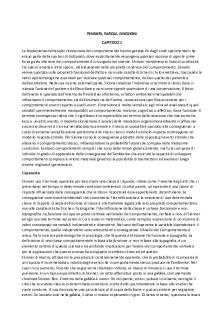Life on parole PDF

| Title | Life on parole |
|---|---|
| Course | Corrections |
| Institution | Wichita State University |
| Pages | 1 |
| File Size | 32.6 KB |
| File Type | |
| Total Downloads | 92 |
| Total Views | 148 |
Summary
Summary on the documentary- Life on parole...
Description
The documentary provided a good reflection of the overall parole system in the United States. Looking at the parole systems in the documentary from several different perspectives, I can tell that it’s a loop where a parolee could possibly get lost. There are too many restrictions for the parolee, and way too many loopholes for the designated parole officer to send the parolee back to jail. Parole officers should be working as social workers, to help the parolee get a head start on their life again. Some of the officers in the documentary seemed to be doing exactly that, while there were other examples where the officer was only looking for causes or violations that would send the parolees back to prison. Because of that, parolees rarely get a good enough chance to rehabilitate themselves from within, instead of forcibly get rehabilitated by an institution. A single violation or a harmless few mistakes should not be enough to send parolees back to jail. Rehabilitation should include a good chunk of positive reinforcement, alongside the already existing negative reinforcement in our correctional system. Due to the extremely rigorous parole system we have, the documentary also shows how parolees are often frustrated being on parole, with restricted freedom, rather; they would prefer to be sent back to prison to make things easier for them. I believe that is one of the biggest reasons why ex-convicts rarely get out of the system and end up back in prison even when they are out. The documentary shows the good and bad effect of the parole system. It would be unfair to only focus on the largely negative parts. Hence, one of the parolees that I took interest in was Jessica Proctor and her parole officer, Officer Katherine Montoya. Jessica was sentenced for 10 years, with 5 years in parole for assault. Her life took a positive turn as she went on to pursuing her dream in the medical field. She became a CNA soon after. She was on parole while she was attending nursing school. At some point, she was tested positive for marijuana on her drug-test. Officer Montaya decided to give her a second chance and believed in her, after Jessica reassured that she was only stressed out with school and connecting with her son again after the big dent she had made in their relationship, which made her want to take a break. It is up to the parole officer to make or break a parolees’ future. It is very easy for the officer to simply document the violation of parole and send said parolees to jail. But there is a bigger purpose of parole than that, the purpose is to rehabilitate parolees and allow parolees to make good choices for themselves and for their surrounding community. It is officers like Katherine Montoya who understands that purpose and do their job accordingly. This gives me hope that maybe some-day, the potential parole officers who sees the correctional system from a bystander perspective now, won’t make the same mistake as some of the officers. Maybe then, the number of ex-convicts who are stuck in the loop of going back to prison over and over again, will have a significant change in a positive light....
Similar Free PDFs

Life on parole
- 1 Pages

La Parole
- 90 Pages

Essay on JP Morgan\'s Life
- 8 Pages

Notes on Bug Life Cycle
- 2 Pages

Astronomy Essay - Life on Mars
- 7 Pages

Riassunto Parole in libertà
- 34 Pages

Pensieri, Parole, Emozioni
- 6 Pages

Le combinazioni di parole
- 7 Pages

RUS parole de Katoucha
- 2 Pages

Lecture Notes, Parole
- 3 Pages

Saussure Parole & Langue
- 1 Pages

Le Parole del Corpo
- 18 Pages

Le parole della cura
- 14 Pages

Jhumpa In altre parole
- 11 Pages
Popular Institutions
- Tinajero National High School - Annex
- Politeknik Caltex Riau
- Yokohama City University
- SGT University
- University of Al-Qadisiyah
- Divine Word College of Vigan
- Techniek College Rotterdam
- Universidade de Santiago
- Universiti Teknologi MARA Cawangan Johor Kampus Pasir Gudang
- Poltekkes Kemenkes Yogyakarta
- Baguio City National High School
- Colegio san marcos
- preparatoria uno
- Centro de Bachillerato Tecnológico Industrial y de Servicios No. 107
- Dalian Maritime University
- Quang Trung Secondary School
- Colegio Tecnológico en Informática
- Corporación Regional de Educación Superior
- Grupo CEDVA
- Dar Al Uloom University
- Centro de Estudios Preuniversitarios de la Universidad Nacional de Ingeniería
- 上智大学
- Aakash International School, Nuna Majara
- San Felipe Neri Catholic School
- Kang Chiao International School - New Taipei City
- Misamis Occidental National High School
- Institución Educativa Escuela Normal Juan Ladrilleros
- Kolehiyo ng Pantukan
- Batanes State College
- Instituto Continental
- Sekolah Menengah Kejuruan Kesehatan Kaltara (Tarakan)
- Colegio de La Inmaculada Concepcion - Cebu

